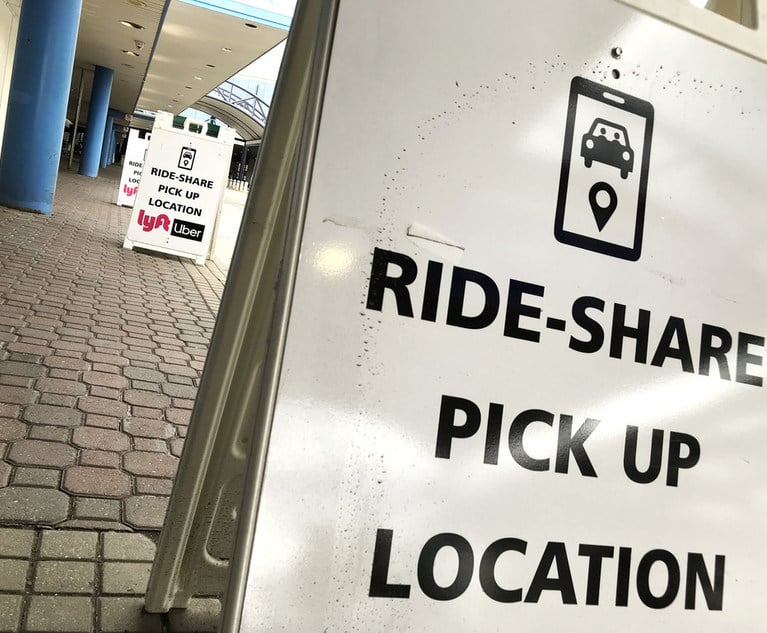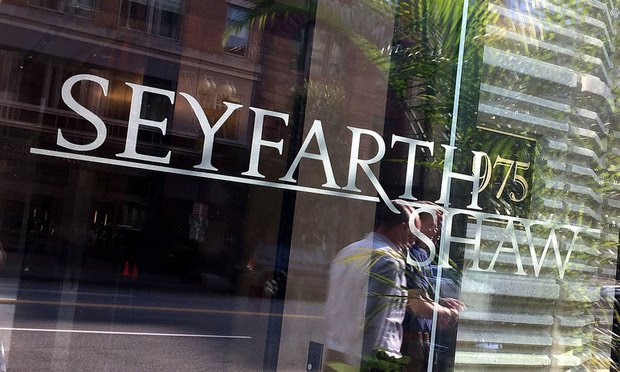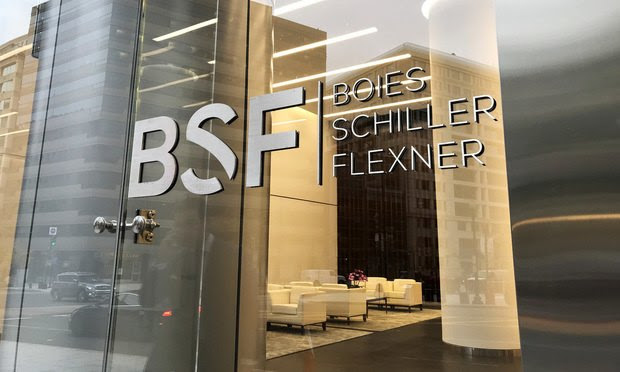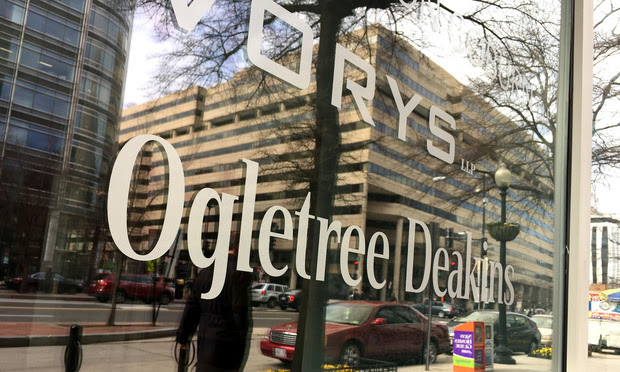Labor of Law: New Seyfarth Class Action Report | Ogletree's AI Play | Plaintiffs Firm DQ'd in Uber Suit | Plus: Who Got the Work, and Our Moves Roundup
Seyfarth Shaw's latest class action settlement report is out, and we've got the details. Plus: Ogletree Deakins makes it play for AI, and the plaintiffs firm Keller Lenkner was disqualified in a worker-classification suit against Uber. Scroll down for Who Got the Work, our moves roundup and more. Thanks for reading!
January 10, 2019 at 12:00 PM
8 minute read
Welcome to Labor of Law. Happy New Year. Seyfarth Shaw's latest class action report is out, and we've got some highlights below. Plus, there's a ton of court action catching attention—including a plaintiffs firm getting disqualified in a suit against Uber; a $65.5M settlement involving au pairs who claimed reduced-wage collusion; and federal employee unions are piling up lawsuits over the government shutdown. Scroll down for the latest Who Got the Work and our weekly roundup of moves.
I'm Erin Mulvaney in Washington, covering labor and employment from the Swamp to Silicon Valley. Follow this weekly newsletter for the latest analysis and happenings. If you have a story idea, feedback or just want to say hi, I'm at [email protected]and on Twitter @erinmulvaney.
Workplace Settlement Values Drop: Seyfarth
Seyfarth Shaw released its annual Workplace Class Action Litigation Report this week, analyzing a record 1,453 class action rulings on a circuit-by-circuit and state-by-state basis to capture key themes from 2018 and emerging litigation trends.
“Fueled by key Supreme Court rulings and the Me Too movement, 2019 is likely to present employers with more complex challenges than ever before,” according to the report, prepared by Seyfarth partner Gerald Maatman.
One big finding in the report: “Overall, we saw a surprisingly sharp drop in settlement values this past year. Combined with the Supreme Court's decision to grant employers their most powerful tool in decades to limit class action exposure in the Epic Systems ruling, 2019 presents several new dynamics for employers to navigate as we continue to keep a close watch on the shifting priorities of the White House as well.”
My colleague Sue Reisinger has more on the report here at Corporate Counsel.
Here are the highlights of the report:
>> The number of cases filed by the U.S. Equal Employment Opportunity Commission reached a three-year high. The agency filed 199 lawsuits last year, up from 184 in 2017. However, the value of the top government settlements fell steeply, from $485.25 million in 2017 to $126.7 million in 2018.
>> The plaintiffs bar posted a record high certification success rate in 2018 of 79 percent in wage and hour litigation. Employer efforts to successfully decertify these cases also dropped by 11 percent as employers won only 52 percent of “second stage” decertification rulings, down from 63 percent in 2017.
>> After reaching an all-time record high of $2.72 billion in 2017, the monetary value of the top workplace class action settlements decreased by more than 50 percent in 2018. Settlements sank to a five-year low of $1.32 billion in 2018, experiencing a record one-year drop of $1.4 billion. Even with a better success rate in 2018, settlements shrank across the board as plaintiffs failed to monetize class action victories at the same rate as 2017.
Who Got the Work
➤➤ Boies Schiller Flexner and co-counsel Towards Justice reached a $65.5 million settlement on behalf of a class of 100,000 au pairs. The lawsuit, filed in November 2014, alleged 15 companies paid au pairs who participated in a government program below the minimum wage. The firms representing the defendants included Choate Hall & Stewart; Holland & Hart; Fisher & Phillips; Ogletree, Deakins, Nash, Smoak & Stewart; Gibson, Dunn & Crutcher; Gordon & Rees; Brownstein Hyatt Farber Schreck; and Armstrong Teasdale.
“We're pleased that our years of hard work will bring justice to so many young children workers and fundamentally change the way the au pair industry operates,” Boies Schiller attorney Peter Skinner said. We've got more on the settlement here at Law.com.
➤➤ A New York federal trial judge says three former Wells Fargo Advisors brokers can proceed with class claims seeking overtime pay. U.S. District Judge Paul Engelmayer ”denied Wells Fargo's attempt to vacate a ruling from an American Arbitration Association arbitrator that a class-wide case was permissible under the terms of the brokers' employment agreements,” according to an AdvisorHub report on the ruling.
“Wells Fargo may now rue that the arbitral forum it chose has reached this outcome, and that this Court's review is limited to determining only whether the Arbitrator exceeded her broad authority,” Engelmayer wrote in his ruling. “But that was a risk Wells Fargo accepted when it selected arbitration as the forum in which it would litigate employment disputes with the respondent financial advisors.”
A team from Morgan, Lewis & Bockius represented Wells Fargo, and Outten & Golden represented the former Wells Fargo advisors. Bloomberg Law has more here.
➤➤ Speaking of Wells Fargo, Bloomberg Law has this report: “Wells Fargo Bank defeated an appeal by a Fort Lauderdale, Fla., employee who said she was fired for refusing to participate in the illicit sales practices that drove a 2016 national scandal and led to $185 million in penalties. Diana Berber isn't entitled to a preliminary injunction forcing Wells Fargo to rehire her as a personal banker.” A team from Littler Mendelson, including Elaine Keyser and Fabian Ruiz, represented Wells Fargo, and Lawrence Metsch of Florida's The Metsch Law Firm represented Berber. Read the decision here.
➤➤ The National Treasury Employees Union's in-house legal team, led by general counsel Gregory O'Duden, on Tuesday sued the Trump administration over the partial shutdown. The Antideficiency Act only authorizes the executive branch to require employees to work, without pay, in limited circumstances involving an imminent threat to human life or property,” according to the complaint in U.S. District Court for the District of Columbia. “OMB has purported to authorize agencies to require employees to work in a far broader range of circumstances than the Antideficiency Act allows.” Meanwhile, lawyers representing border patrol officers are suing in the Federal Claims court. Read the complaint here.
➤➤ Lawyers from Ogletree, Deakins, Nash, Smoak & Stewart represented Hobby Lobby in a National Labor Relations Board arbitration case that was resolved this month. The board cited Epic Systems and upheld a mandatory arbitration agreement. David Rosenfeld of Weinberg, Roger & Rosenfeld represented the worker in the case.
Notable Moves & Announcements
>> Morgan, Lewis & Bockius has hired Shannon Donnelly as a labor and employment partner, focusing on immigration. Donnelly formerly headed Baker McKenzie's immigration and global mobility team. She joins Morgan Lewis with Laura Garvin, of counsel at Baker McKenzie, and a team of associations.
>> Karen Glickstein will join Jackson Lewis in the Overland Park office as a principal in the labor and employment practice. She joined from Polsinelli, where she was a shareholder. Jackson Lewis also hired Susan Zoeller in the Indianapolis office as a principal. Zoeller joins the firm from Quarles & Brady.
>> Natalie Tynan, a former U.S. Department of Homeland Security lawyer, joinedHunton Andrews Kurth as a senior attorney in the immigration group in Washington. She most recently was unit chief of policy at Immigration and Customs Enforcement.
>> Outten & Golden has teamed up with Jillian Weiss, who joined the LGBTQ Practice Group as of counsel. Weiss was formerly executive director of the Transgender Legal Defense & Education Fund.
Around the Water Cooler
• Ogletree Deakins was the firm to publicly announce a licensing deal with legal AI firm LegalMation. Ogletree is now the lone Big Law labor and employment firm to use the tool, announcing Wednesday it signed an exclusive partnership arrangement to use the LegalMation platform and to build new products from it. [The American Lawyer]
• The plaintiffs firm Keller Lenker was disqualified representing Diva Limousine in a worker-classification suit against Uber Technologies, a California federal judge ruled Wednesday. Central to the dispute was the work a former U.S. Chamber appellate lawyer—who jumped to Keller Lenkner—had done with Uber. [The Recorder]
• Oracle and Palantir argued their diversity figures were “trade secrets” as the companies fought the release of the numbers during Labor Department investigations. [Reveal News]
• Companies with more than five employees have less than a year to provide interactive sexual harassment training to all California-based workers, according to the state's newly implemented requirements. [Law.com]
• Meanwhile, California's aggressive paid leave policy will propose a six-month leave. How will the state pay for it? [The New York Times]
• U.S. District Judge Vince Chhabria in California explains why he won't fill a clerk slot until he's interviewed at least one minority candidate and one candidate from a non-“T-14” law school. This is a playbook highlighting the so-called Rooney rule. [National Law Journal]
• Alan Krueger of Princeton University and Lawrence Katz of Harvard say their estimates on the gig economy were too high, skewed by spotty data and the recession of a decade ago. [Wall Street Journal]
This content has been archived. It is available through our partners, LexisNexis® and Bloomberg Law.
To view this content, please continue to their sites.
Not a Lexis Subscriber?
Subscribe Now
Not a Bloomberg Law Subscriber?
Subscribe Now
NOT FOR REPRINT
© 2025 ALM Global, LLC, All Rights Reserved. Request academic re-use from www.copyright.com. All other uses, submit a request to [email protected]. For more information visit Asset & Logo Licensing.
You Might Like
View All
Labor of Law: As Workers Suffer With Long Covid, Employers May Rethink Accommodations for Other Disabilities

Labor of Law: Federal Noncompete Ban Would Be Far From Last Word on Issue

Labor of Law: New Federal Rule Could Upend State Efforts to Count Ride-Share Drivers as Contractors

Labor of Law: Employer Statements on Abortion Could Spur Discrimination, Hostile Work Environment Claims
Trending Stories
- 1How the Court of Public Opinion Should Factor Into Litigation Strategy
- 2Debevoise Lures Another SDNY Alum, Adding Criminal Division Chief
- 3Cooley Promotes NY Office Leader to Global Litigation Department Chair
- 4What Happens When Lateral Partners’ Guaranteed Compensation Ends?
- 5Tuesday Newspaper
Who Got The Work
J. Brugh Lower of Gibbons has entered an appearance for industrial equipment supplier Devco Corporation in a pending trademark infringement lawsuit. The suit, accusing the defendant of selling knock-off Graco products, was filed Dec. 18 in New Jersey District Court by Rivkin Radler on behalf of Graco Inc. and Graco Minnesota. The case, assigned to U.S. District Judge Zahid N. Quraishi, is 3:24-cv-11294, Graco Inc. et al v. Devco Corporation.
Who Got The Work
Rebecca Maller-Stein and Kent A. Yalowitz of Arnold & Porter Kaye Scholer have entered their appearances for Hanaco Venture Capital and its executives, Lior Prosor and David Frankel, in a pending securities lawsuit. The action, filed on Dec. 24 in New York Southern District Court by Zell, Aron & Co. on behalf of Goldeneye Advisors, accuses the defendants of negligently and fraudulently managing the plaintiff's $1 million investment. The case, assigned to U.S. District Judge Vernon S. Broderick, is 1:24-cv-09918, Goldeneye Advisors, LLC v. Hanaco Venture Capital, Ltd. et al.
Who Got The Work
Attorneys from A&O Shearman has stepped in as defense counsel for Toronto-Dominion Bank and other defendants in a pending securities class action. The suit, filed Dec. 11 in New York Southern District Court by Bleichmar Fonti & Auld, accuses the defendants of concealing the bank's 'pervasive' deficiencies in regards to its compliance with the Bank Secrecy Act and the quality of its anti-money laundering controls. The case, assigned to U.S. District Judge Arun Subramanian, is 1:24-cv-09445, Gonzalez v. The Toronto-Dominion Bank et al.
Who Got The Work
Crown Castle International, a Pennsylvania company providing shared communications infrastructure, has turned to Luke D. Wolf of Gordon Rees Scully Mansukhani to fend off a pending breach-of-contract lawsuit. The court action, filed Nov. 25 in Michigan Eastern District Court by Hooper Hathaway PC on behalf of The Town Residences LLC, accuses Crown Castle of failing to transfer approximately $30,000 in utility payments from T-Mobile in breach of a roof-top lease and assignment agreement. The case, assigned to U.S. District Judge Susan K. Declercq, is 2:24-cv-13131, The Town Residences LLC v. T-Mobile US, Inc. et al.
Who Got The Work
Wilfred P. Coronato and Daniel M. Schwartz of McCarter & English have stepped in as defense counsel to Electrolux Home Products Inc. in a pending product liability lawsuit. The court action, filed Nov. 26 in New York Eastern District Court by Poulos Lopiccolo PC and Nagel Rice LLP on behalf of David Stern, alleges that the defendant's refrigerators’ drawers and shelving repeatedly break and fall apart within months after purchase. The case, assigned to U.S. District Judge Joan M. Azrack, is 2:24-cv-08204, Stern v. Electrolux Home Products, Inc.
Featured Firms
Law Offices of Gary Martin Hays & Associates, P.C.
(470) 294-1674
Law Offices of Mark E. Salomone
(857) 444-6468
Smith & Hassler
(713) 739-1250












